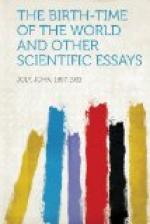161
OTHER MINDS THAN OURS?
IN the year 1610 Galileo, looking through his telescope then newly perfected by his own hands, discovered that the planet Jupiter was attended by a train of tiny stars which went round and round him just as the moon goes round the Earth.
It was a revelation too great to be credited by mankind. It was opposed to the doctrine of the centrality of the Earth, for it suggested that other worlds constituted like ours might exist in the heavens.
Some said it was a mere optic illusion; others that he who looked through such a tube did it at the peril of his soul—it was but a delusion of Satan. Galileo converted a few of the unbelievers who had the courage to look through his telescope. To the others he said, he hoped they would see those moons on their way to heaven. Old as this story is it has never lost its pathos or its teaching.
The spirit which assailed Galileo’s discoveries and which finally was potent to overshadow his declining years, closed in former days the mouths of those who asked the question written at the head of this lecture: “Are we to believe that there are other minds than ours?”
162
Today we consider the question in a very different spirit. Few would regard it as either foolish or improper. Its intense interest would be admitted by all, and but for the limitations closing our way on every side it would, doubtless, attract the most earnest investigation. Even on the mere balance of judgment between the probable and the improbable, we have little to go on. We know nothing definitely as to the conditions under which life may originate: whether these are such as to be rare almost to impossibility, or common almost to certainty. Only within narrow limits of temperature and in presence of certain of the elements, can life like ours exist, and outside these conditions life, if such there be, must be different from ours. Once originated it is so constituted as to assail the energies around it and to advance from less to greater. Do we know more than these vague facts? Yes, we have in our experience one other fact and one involving much.
We know that our world is very old; that life has been for many millions of years upon it; and that Man as a thinking being is but of yesterday. Here is then a condition to be fulfilled. To every world is physically assigned a limit to the period during which it is habitable according to our knowledge of life and its necessities. This limit passed and rationality missed, the chance for that world is gone for ever, and other minds than ours assuredly will not from it contemplate the universe. Looking at our own world we see that the tree of life has,
163
indeed, branched, leaved and, possibly, budded many times; it never bloomed but once.




